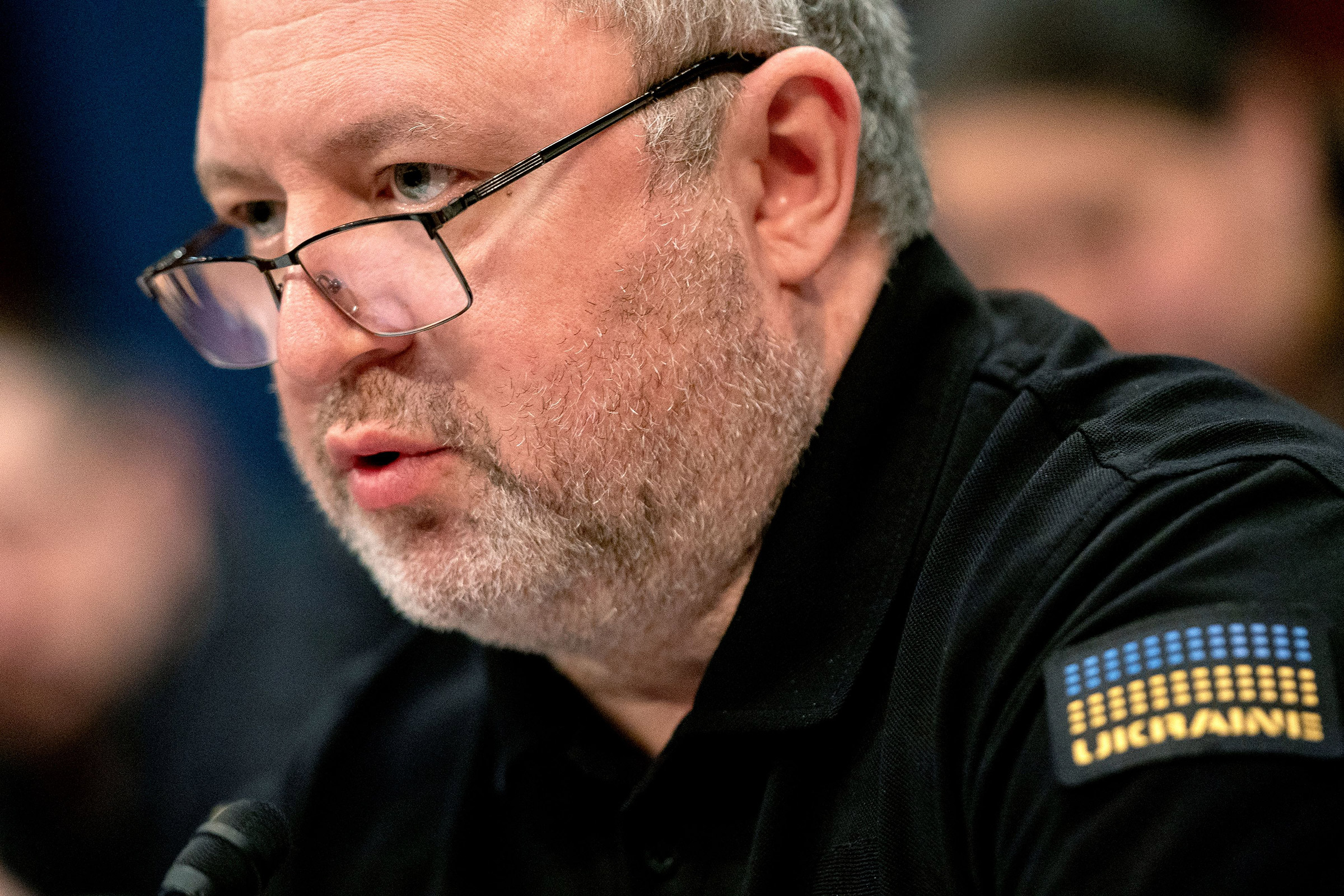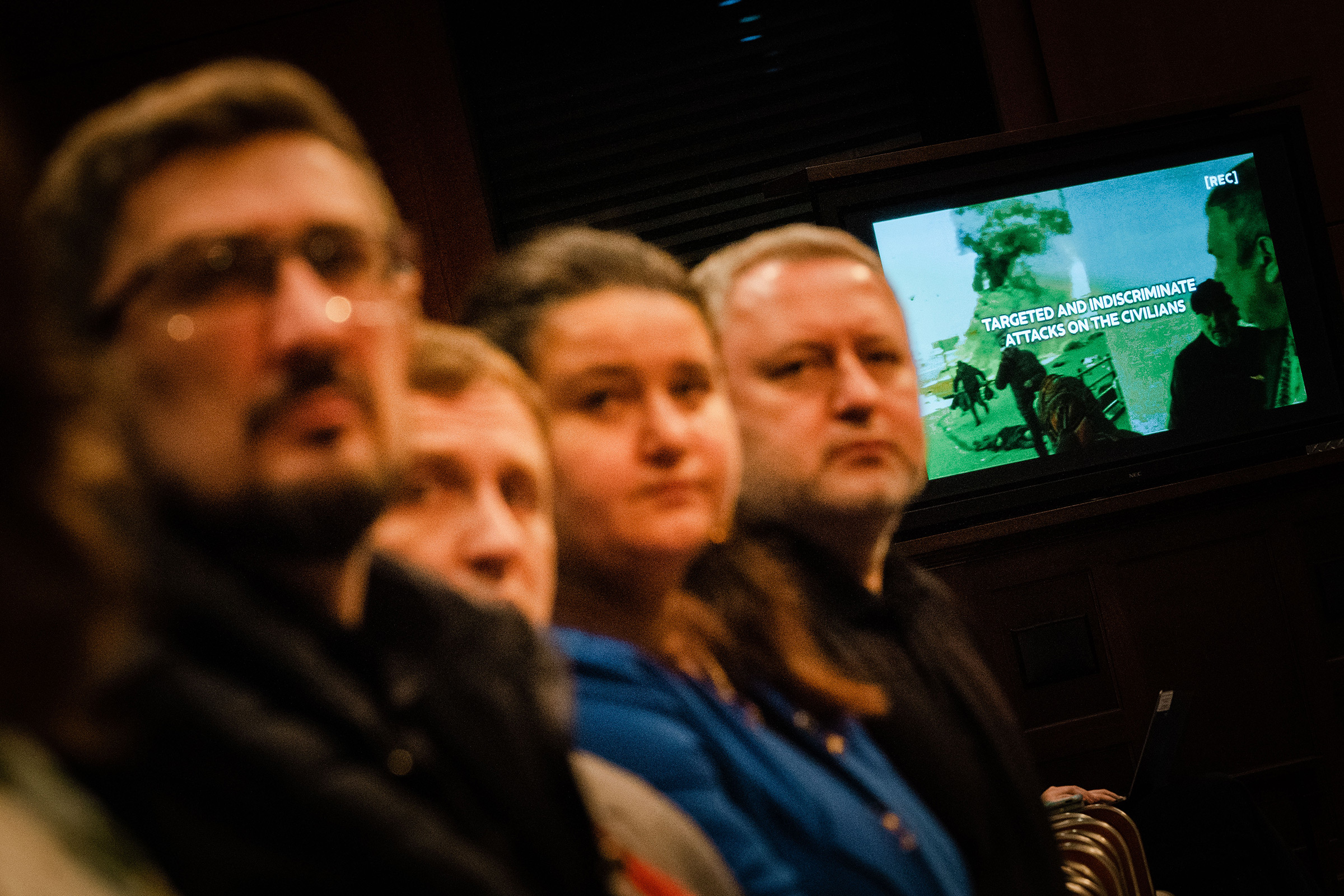
Andriy Kostin has been serving as Ukraine’s Prosecutor General since July 2022. At that time, Ukrainian government and law enforcement officials were being flooded with an unprecedented amount of images, videos, and other data from Ukrainian civilians documenting alleged war crimes and human-rights violations committed by Russian troops.
Kostin’s office is operating a database to collect all of this information, and has set up websites and chatbots to help Ukrainians categorize and submit digital evidence. Now, after 20 months of war, TIME spoke to Kostin in Kyiv about how his office is developing new ways to analyze evidence to build and prosecute war-crimes cases with the help of technology companies and international partners.
Q: When it comes to prosecuting war crimes in this conflict, there’s an overwhelming amount of video and photo evidence being submitted in real time, as well as corroborating data from digital sources, satellite images, cell phone providers. In what ways does this fit into the traditional framework used to prosecute war crimes, and how are you doing things differently?
A: We're doing something which has not been done before. I think the most important challenge for us is to ensure comprehensive accountability. First we are looking at the old elements [and lessons] of the old types of war crimes. In all previous wars and conflicts, everyone was concentrated on crimes against the physical security of people–people who were killed, wounded, assaulted, and humiliated. They were also setting standards which we now use as precedent in our cases. For example when it comes to conflict-related sexual violence…the international community has invested a lot of resources into the proper investigation of these types of crimes and prepared a lot of solutions focusing on a victim or survivor-centered approach.
Read More: How Ukraine Is Crowdsourcing Digital Evidence of War Crimes
More From TIME
These are now included in our own strategic documents and all of our investigators and prosecutors use them. Now, in this conflict, we’re also expanding and looking at a wider range of war crimes.
Q: What kind of war crimes are you focusing on that have never been prosecuted before?
For instance, crimes against the environment [including damage to nuclear facilities, and environmental destruction and pollution that will negatively impact Ukrainians’ health for generations.] The discussion on the international level is much more active now than it even was one year ago, since we started to allocate resources to investigate environmental crimes. But it's important, because these crimes are and will be committed globally. And those who will commit them in other parts of the world will see that there are now the tools and standards to investigate and prosecute them, because we’re creating strategic documents.
We are also now investigating or prosecuting cyber attacks as war crimes, which are very difficult to investigate. It’s never been done before. But we’re doing it with the help of our partners, namely Palantir and Microsoft, who are ready to help us because they also understand that in looking deeply into such situations and investigating them as war crimes, we can highlight them to such an extent that many others will look very carefully [before committing them]. This is a terrorist behavior. So it's very important that we cover these new avenues.

Q: How are you using technology and new digital tools to collect and analyze evidence?
In order to build these cases, we often have to use evidence that is not enough at the first glance. If a witness says something happened to them, we need to identify the perpetrator, which is the most challenging task in the daily work of our prosecutors, and for that we will use all elements of new technologies which often is the only useful tool we have.
For instance, there were civilians who were attacked by Russian forces while trying to evacuate, and survivors went to investigators. They could identify the specific place where it happened. When the territory was liberated, we were able to find the documents of the [Russian] units, which had birthdays and some other data. Then we used [open-source intelligence] instruments to analyze their social networks with the help of NGOs and civil-society organizations. I have a specific platform in my office, the International Council of Experts, where more than 45 NGOs are helping us on war crimes accountability. So we were able to identify most of them. And when we showed these to the survivors, who had interacted with the Russian [troops], they would confirm it: ‘I saw this face.’
Read More: The Crime Scene Left Behind at a Summer Camp in Bucha.
Some of these cases are already in court in Kyiv [where the International Criminal Court has opened an office]. We’ve used Palantir as a unique instrument to [analyze] all the data, and Microsoft for voice recognition in cases where perpetrators were calling for genocide and an aggressive war. All of this helps so much because these are unique tools to analyze voices and faces to build the cases. And we are also [getting close] to using more artificial intelligence to go over the hundreds of terabytes of photo, video, voice, etc.
Q: How are you collecting the evidence you need from the more than six million Ukrainian refugees abroad, and millions more displaced civilians inside the country? How are international partners helping with this?
Creating these technological tools is not just about [identifying perpetrators] but also about not losing any evidence that can be used to build the case. Legal interaction between different jurisdictions is always a challenge. There may be evidence in a regional office, or coming from a temporarily displaced person in Ukraine, and other pieces of evidence that may appear somewhere in Poland or in Germany where someone came to the police. If we put together all three about the same event, they will complement each other and complete this puzzle.
There are also other new tools, like the Core International Crimes Evidence Database (CICED). It’s a new database, absolutely secured, where you can include information for joint investigations. We have thousands and thousands of Ukrainians [submitting reports] in different countries. It took more than one year to make it happen, and it was very important that the European Union [Agency for Criminal Justice Cooperation] really invested in it. Now, if one person in Germany or Poland or the Czech Republic comes to a police officer and tells them something that happened in Bucha, they will keep it carefully in the file. This database will be fully operational in November.
Q: Given the vast amount of digital evidence, and the fact that it’s being submitted in real time as the war is ongoing, can the international justice system keep up?
The judicial process in some occasions needs to be more rapid, because justice can be denied when it is delayed. We are also in constant dialogue with Ukrainian courts [to prioritize war-crime cases]. For many of our victims and survivors, it's important to even have these [prosecuted] in absentia, so they know that we did everything possible to restore their dignity.
We will use every legal avenue, and we will use every technology to come up with a way.
More Must-Reads From TIME
- The 100 Most Influential People of 2024
- Coco Gauff Is Playing for Herself Now
- Scenes From Pro-Palestinian Encampments Across U.S. Universities
- 6 Compliments That Land Every Time
- If You're Dating Right Now , You're Brave: Column
- The AI That Could Heal a Divided Internet
- Fallout Is a Brilliant Model for the Future of Video Game Adaptations
- Want Weekly Recs on What to Watch, Read, and More? Sign Up for Worth Your Time
Write to Vera Bergengruen at vera.bergengruen@time.com